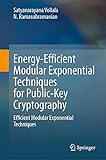Energy-Efficient Modular Exponential Techniques for Public-Key Cryptography [electronic resource] : Efficient Modular Exponential Techniques /
Material type: TextPublisher: Cham : Springer International Publishing : Imprint: Springer, 2021Edition: 1st ed. 2021Description: XX, 257 p. 133 illus., 21 illus. in color. online resourceContent type:
TextPublisher: Cham : Springer International Publishing : Imprint: Springer, 2021Edition: 1st ed. 2021Description: XX, 257 p. 133 illus., 21 illus. in color. online resourceContent type: - text
- computer
- online resource
- 9783030745240
- 005.8 23
- QA76.9.A25
Chapter 1. Introduction -- Chapter 2. Public-Key Cryptographic Algorithms and Techniques -- Chapter 3. Modular Exponentiations and Modular Multiplication -- Chapter 4. Improving the Performance of Public-Key Techniques -- Chapter 5. Hardware Implementation of Bit Forwarding Techniques -- Chapter 6. Improved Hardware Realization for Public-key Transformations -- Chapter 7. Conclusion. .
This unique and focused research monograph addresses the question: How can the performance of modular exponentiation, which is the crucial operation of many public-key cryptographic techniques, be improved? Cryptographic applications--such as RSA algorithms, ElGamal cryptography, elliptic-curve cryptography, Rabin cryptosystems, Diffie -Hellmann key-exchange algorithms, and the Digital Signature Standard--use modular exponentiation extensively. The performance of all these applications strongly depends on the efficient implementation of modular exponentiation and modular multiplication. Since 1984, when Montgomery first introduced a method to evaluate modular multiplications, many algorithmic modifications have been done for improving the efficiency of modular multiplication, but very less work has been done on the modular exponentiation to improve the efficiency. The book focuses on energy-efficient modular exponentiation for cryptographic hardware. Spread across five chapters, this well-researched text focuses in detail on bit forwarding techniques and the corresponding hardware realizations. Readers will also discover advanced performance-improvement techniques based on high radix multiplication and cryptographic hardware based on multi-core architectures. Satyanarayana Vollala is a full-time Ph.D. research scholar in the Department of Computer Science and Engineering at National Institute of Technology, Tiruchirappalli, Tamil Nadu, India. N. Ramasubramanian is an associate professor in the Department of Computer Science and Engineering at National Institute of Technology, Tiruchirappalli, India.


There are no comments on this title.